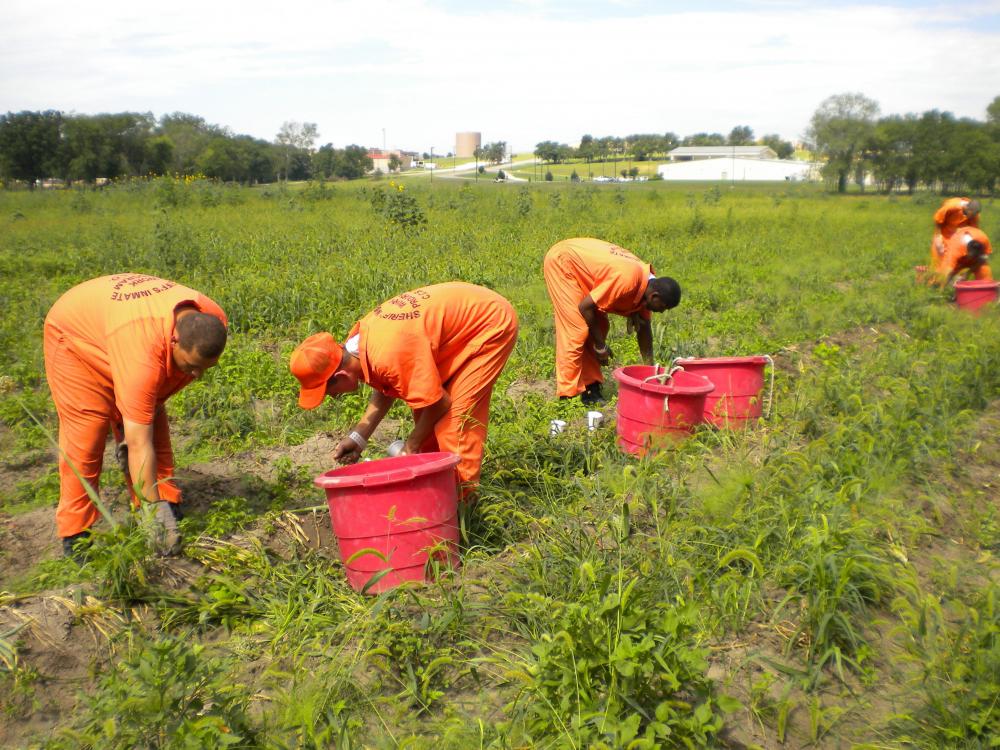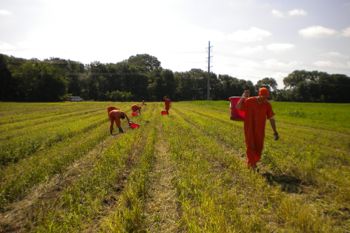
First-time offenders grow vegetables that provide nutritional meals for the inmates. Photos courtesy of Collin County Sheriff's office.
Feb. 29, 2016
Some inmates in Collin County have the opportunity to spend part of their jail sentence tending a garden, thanks to a rehabilitation program.
As part of the Sheriff’s Convicted Offender Re-Entry Effort Program, a select group of first offenders grow tomatoes, okra, zucchini, two kinds of onions, cantaloupe, a few water melons, peppers, corn and a large amount of potatoes behind the Collin County Detention Center on a 33-acre tract of land.
“We dug two small ponds, with a potential third pond, as a source of water, and we grow vegetables the natural way with no herbicides,” says Sheriff Terry Box, who added that they do use some chemical fertilizers.
 In 1989, Collin County bought 282 acres for the future site of the sheriff’s office and administrative offices. The Collin County Detention Center was opened in March 1994. According to Sheriff Terry Box, who has been with Collin County 31 years, after about a year, they realized that they had land available to farm behind the jail. And, so, a vegetable farm was born.
In 1989, Collin County bought 282 acres for the future site of the sheriff’s office and administrative offices. The Collin County Detention Center was opened in March 1994. According to Sheriff Terry Box, who has been with Collin County 31 years, after about a year, they realized that they had land available to farm behind the jail. And, so, a vegetable farm was born.
At least 19 years ago, Sheriff Box and others got with an organization called Adult Probation, now Community Services, and judges and suggested that non-assaultive first-time offenders be sentenced up to 18 months work detail and agree to the Sheriff’s Convicted Offender Re-Entry Effort Program. SCORE allows inmates to work on work crews in the morning, and afternoons are spent in classes in the jail learning such things as to how to apply for a job, how to break bad habits, how to become productive citizens, and GED preparation. Collin County Detention Center is the first jail in Texas to have GED testing. A court cannot force an inmate to work in the program, but if a judge sentences someone to the program and if they agree, they can participate. The SCORE Program is audited every year.
“Most inmates have committed things like minor thefts or DWIs,” says Sheriff Box.“There are no repeat offenders. We hope that by them spending a little time in jail, they will not come back.”
During a year, there are 35 to 40 inmates in the SCORE Program. They divide into two different work crews, with some working all over the county and both men and women working in the vegetable garden.
“We have all kind of work machinery, from chain saws to helmets,” shares Sheriff Box. “We clean cemeteries, clean up after tornadoes – mainly any kind of damage done to county or city properties. We figured up how many hours the groups work, and we save the city and county between $500,000 and $600,000 a year.”
In the spring, the garden crew utilizes major tractors and plows to plant. Weeding and watering takes place in the summer, with harvesting in the fall. When the vegetables are harvested, inmates enjoy fresh/nutritional food. Excess onions and potatoes are dry stored, and excess vegetables that can be blanched are put in large plastic tubs in freezers in the minimum security jail.
“The main reason for the vegetable garden is to lower food costs and provide nutritional meals for the inmates,” says Sheriff Box. “We keep a count of all the vegetables and if anything perishable is left over, we take it to different Collin County senior citizen organizations.”
Sheriff Box says that about five years ago, he and two other sheriffs went before legislature in Austin and got the law changed whereby inmate work crews can work for non-profits. Presently, among others, two non-profits for which they work are ManeGate Therapeutic Horsemanship, which services handicapped people, and the Collin County Animal Services.
“The vegetable garden, SCORE Program and non-profits are a ‘win-win’ for both the inmates and county,” said Sheriff Box.
Sign up for the weekly Green Source DFW Newsletter to stay up to date on everything green in North Texas, the latest news and events. Follow us on Facebook, Twitter and Pinterest.









